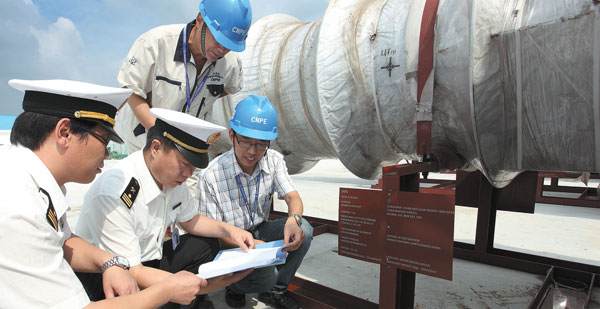Authorities improve services and facilities
Customs authorities around China have stepped up efforts to improve their services and facilities to ready for a wave of opportunities expected from the Belt and Road Initiative.
Launched by President Xi Jinping in 2013, the initiative refers to the Silk Road Economic Belt and the 21st Century Maritime Silk Road initiatives, transport infrastructure projects linking Asia and Europe.
Fuzhou
In March, the National Development and Reform Commission, the Ministry of Foreign Affairs and the Ministry of Commerce released a joint report on the vision and new moves in the Belt and Road Initiative. In the report, Fujian province is listed as the core area of the 21st Century Maritime Silk Road initiative.
According to the customs authority in Fuzhou, the capital city of the province, the import and export volume of Fujian with countries along the 21st Century Maritime Silk Road in the first four months of this year reached more than 80 billion yuan ($12.9 billion), accounting for 25 percent of the province's total import and export volume.
On May 1, Fuzhou customs joined the customs integration reform of Guangdong province. The reform allows businesses from Fujian, Hainan and Guangdong provinces and the Guangxi Zhang autonomous region to use any of 11 customs offices in the four regions.
Xiamen
Xiamen, Fujian province, is focused on customs service reforms, trying to sharpen the competitive edge of the city's port to back up Fujian's role.
Xiamen customs started by improving services to offer more convenience to businesses, including simplifying application procedures.
The city's customs office has helped local businesses expand to regions along the 21st Century Maritime Silk Road. The office will carry out research on customs and trade policies in those regions, helping local businesses find their ideal markets. Xiamen customs has also tapped into cross-border e-commerce business.
Xi'an
In response to the Belt and Road Initiative, the ancient city of Xi'an in Shaanxi province has stepped up its efforts in opening-up.
The services and infrastructure the city's customs offices can offer, including the Xi'an Xianyang International Airport, road and port transport, and online platforms, and "clear" the way to the city's further opening-up.
Xi'an is also home to the province's major bonded zones. In each city, there are areas supervised by customs that deal with international cooperation and trade, such as bonded zones and cross-border industrial parks. Xi'an customs places great importance on these areas to fuel the city's development.
In 2013, a provincial-level area engaging in international cultural exchanges moved to the Xi'an Comprehensive Bonded Zone. Accommodating leading players in the city's cultural industries and offering policy support, the trade area is trying to form a cluster of cultural industries.
Urumqi
Starting from May 1, nine customs authorities in regions covered by the Silk Road Economic Belt, including Urumqi, Qingdao, Zhengzhou and Taiyuan, adopted their own customs integration system, which offers unified services in any of nine offices.
Sun Zhijie, head of the Urumqi customs office, said the Xinjiang Uygur autonomous region is the core area of the Silk Road Economic Belt and Urumqi should put more effort into supporting that role.
Sun sees the region's bonded zones as a way to attract more industries to settle in Xinjiang, which will help the autonomous region further open-up to the world.
Urumqi customs has compiled research reports and policy guides for local companies, briefing them about preferential policies at the functional areas supervised by customs.
zhuanti@chinadaily.com.cn
|
Customs officials speak with workers at a building site. Provided to China Daily |
(China Daily 05/27/2015 page7)















